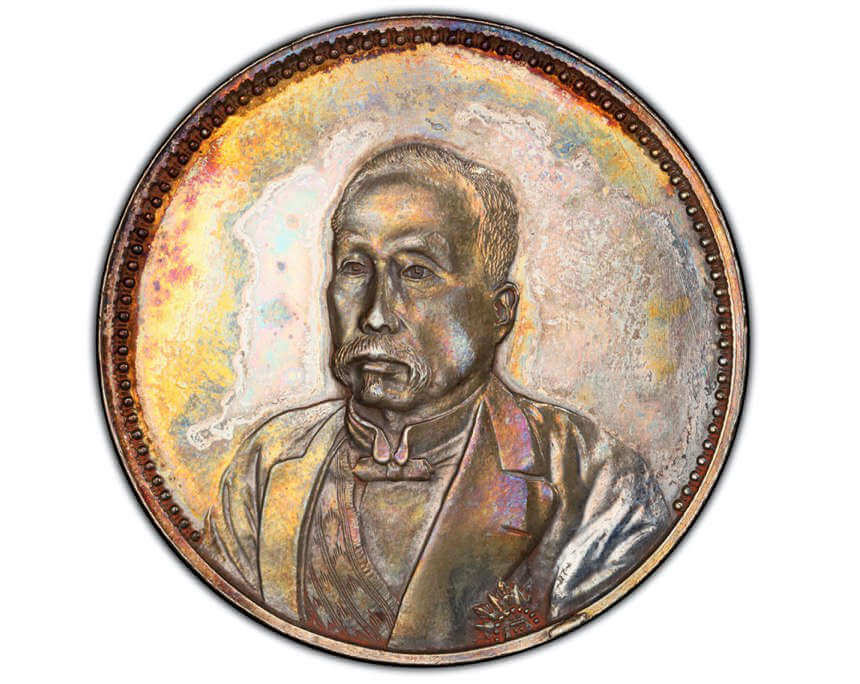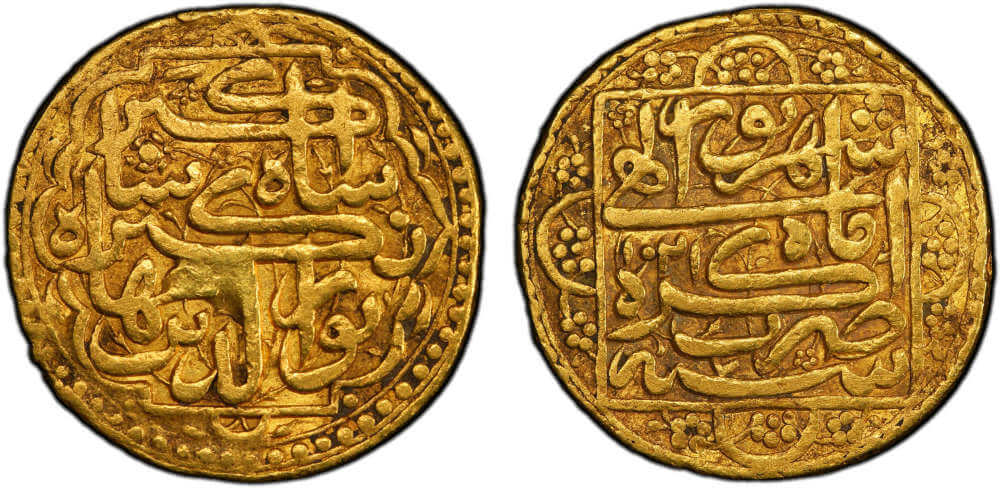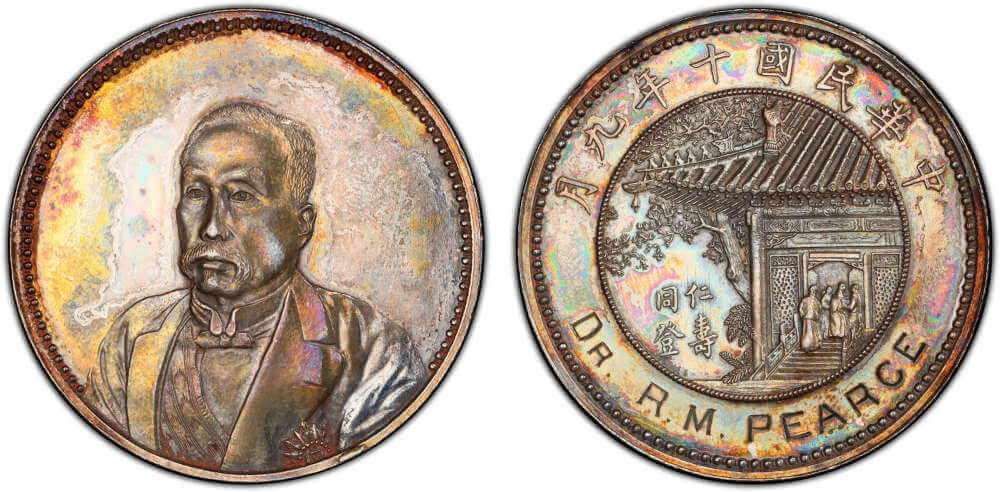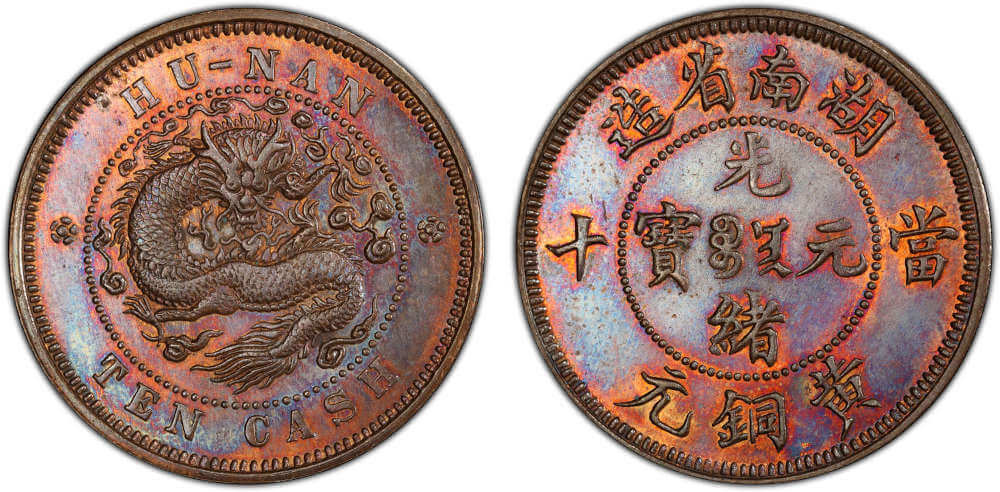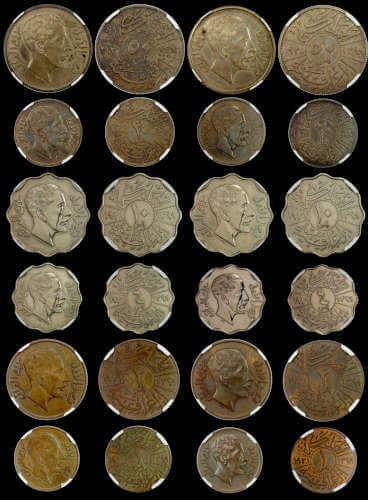Hand-Engraved Chinese “Pavilion” Dollar Leads Steve Album’s Auction 46
Stephen Album Rare Coins
Auction 46
Coins
18-21 May 2023
USA-Santa Rosa
Stephen Album Rare Coins will hold its Auction 46 on May 18-21, 2023 at their new offices in Santa Rosa, California. The auction is made up of 2,800 lots of Ancient, Islamic, Indian, Chinese, and World Coins. The first two days offer floor bidding in addition to internet bidding, while the third and fourth days will be internet-only sessions. Featured in this auction will be the Charles W. Lueders Collection of Indian & Asian Coins and the Butalia Collection of Sikh Empire Coins.
The coin featured on the cover of the printed catalog is certain to create a buzz of excitement on the bidding floor when it comes up for auction. It is a Chinese “pavilion” dollar engraved for Dr. R.M. Pearce. Only a handful of these officially hand-engraved dollars have surfaced, and this is the first piece to be auctioned with the original award letter from the Office of the President of China! Some highlights from the sale follow:
- Lot 173: Islamic. Arab-Armenian. Anonymous, ca. 690-700, AR zuzun (3.16g), year “6”, A-M97, in the name of the Sasanian king Hormizd IV, with the full Shahada filling the obverse margin after the phrase bism Allah, and with the denomination ZWZWN, Aramaic for “drachm”, instead of a mint name on the standard position on the reverse, superb strike for this type, full EF, RRRR. There are two examples of this type with the full Shahada posted on Zeno, #96964 with the additional phrase “rabbi Allah” added on the reverse margin (sold in M&E Auction 48, Lot 1), and #153562 with “rabbi Allah” instead of ZWZWN at the mint location on the reverse. The full Shahada was introduced to the Arab-Sasanian coinage during the governorship of al-Hajjaj b. Yusuf (694-713), whence it seems likely that this type could not have been introduced before 694, replaced shortly afterwards by the type that replaced the name Hormizd with Muhammad (A-E97) and the Arabic word waf in the obverse margin, introduced circa 700. The prototype was the relatively common Sasanian-Armenian type in the name of Hormizd, usually with year “6” and the phrase ZWZWN in lieu of mint name (e.g., Zeno-17577). Estimate: $17,000 to $19,000.
- Lot 786: Islamic. Safavid. Tahmasp II, 1722-1732, AR presentation 20 shahi (26.73g), Tabriz, AH1135, A-A2689, 52.0 mm; obverse couplet translates as “By the grace of God, Tahmasp the Second struck the sahebqerani coin throughout the world.”; an exquisite example, never mounted, choice EF. A similar specimen sold in Heritage Sale 3021, Lot 21767 (same obverse die). Estimate: $20,000 to $24,000.
- Lot 906: India. Mughal. Jahangir, 1605-1628, AV mohur (10.94g), Agra, AH1021 year 7, KM-176.1, month of Shahrewar; obverse imperial legend within ornate cartouche, reverse with mint, date, and month within lobated square; mount removed (visible on the edge, barely noticeable on the surface), but this is a fully preserved beautiful gold mohur! PCGS graded XF details, RRR. Gold mohurs of a distinctive style were struck only at Agra and only from AH1020-1027, always with a month included on the reverse. The mohurs included obverse & reverse borders that were redesigned every month, with 12 different arrangements issued every year. The great rarity of these mohurs is intensified by the fact that each style would last only one month. For AH1021, the British Museum catalog lists only the months of Di and Mehr, and on CoinArchives appear the months of Farwardin and Khurdad. This piece would be the fifth month we have noted, though it is likely that AH1021 mohurs of every month were struck. Estimate: $20,000 to $25,000.
- Lot 964: India. Mysore. Tipu Sultan, 1782-1799, AV mohur (10.98g), Patan, AH1197 year one (ahad), KM-B129, well-centered, wonderful strike, a choice example of this rare issue, EF-AU, RRR, ex Charles W. Lueders Collection. Gold coins of this type were first struck in AH1197-1200 at the weight of the standard Mughal mohur (about 11.00g). They were then replaced by a larger denomination called four pagodas, dated AM1216-1219, at a weight standard of about 13.75g, equal to four times the weight of the standard Mysore gold pagoda of about 3.43g. Estimate: $14,000 to $17,000.
- Lot 1105: China. Republic. AR dollar, year 10 (1921), Kann-676a, L&M-957, Hsu Shih-chang “Pavilion” type, plain edge without bottom legend variety, hand-engraved DR. R. M. PEARCE on reverse, a lovely toned example and with accompanying original case and letter from the Office of the President of China! PCGS graded SP Genuine / UNC details (for the engraving). The Xu Shichang Dollar (Pavilion Dollar) is one of the most sought-after coins in Chinese numismatics. Dated Month 9 of Year 10 (1921), it depicts President Xu in a decorated Western-style suit jacket and a presidential sash. On the reverse, four figures in traditional Chinese robes greet one another on the steps of a pavilion, alongside the phrase ren shou tong deng (“Virtue and longevity ascend together”). Of all the varieties in silver, the plain-edge type with a hand-engraved name at the reverse bottom is by far the rarest, as this is only the 10th example to appear in a public auction since its first appearance in 1982. It is followed by the unengraved plain-edge type (K-676a), the unengraved reeded-edge type (K-676b), and, most commonly, the reeded-edge type with the legend ji nian bi (“commemorative coin”, K-676). The purpose behind the Pavilion Dollar is not entirely clear. Some writers have suggested it celebrates both President Xu’s 66th birthday and 3rd anniversary in office (both occurring in October, which is the 9th month in the Chinese calendar). Others argue it was struck for the opening of the Peking Union Medical College (PUMC, beijing xiehe yixueyuan). Founded in 1906 by a group of British and American missionary organizations, the college sought to introduce Western medical education to China at a time when modern healthcare was practically non-existent in a nation of more than 400 million. It received generous support from the Rockefeller Foundation, which spent $8 million to construct a brand-new campus in the middle of Beijing. The dedication ceremony and the concurrent medical conference took place on Sept. 15-21, 1921. It was attended by a delegation led by John D. Rockefeller, Jr. himself. Also in attendance were many staff members of the college, government officials, as well as doctors from around China and the world. To commemorate this event, the office of the President gave out this medal (K-676a) to the attendees, as attested by the accompanying letter. This likely took place at the dedication ceremonies on the afternoon of Sept. 19, when cabinet ministers delivered greetings on behalf of the President. Based on contemporary reports, we know that the people whose names appear on the medal were doctors (e.g. Dr. R. G. Mills) and staff (Miss Helen H. Holland) at PUMC, as well as visiting delegates (Mr. E. R. Embree) and conference attendees (Dr. J. A. Bussière). We can also surmise that many attendees received the medal but did not engrave their name on it (e.g. Dr. Andrew H. Woods), judging from the greater number of unengraved examples. This is perhaps because the engraver(s) at the event did not have enough time and only served some of the recipients, as suggested by the diverse positions of the names. Born in Montreal, Canada, Dr. Richard M. Pearce (1874-1930) was a prominent professor of pathology based in New York City. From 1919 to his death, he was the Director of the Division of Medical Education of the Rockefeller Foundation. It was in that capacity that Dr. Pearce visited PUMC as a member of the delegation and received this medal. To our knowledge, his is the only example among the ten Pavilion Dollars to be certified uncirculated (PCGS #46508883, graded details solely due to the engraved name) and accompanied by the original case and letter. It is likely the finest example of this highly coveted type and a testament to the deep roots of US-China relations. Estimate: $75,000 to $100,000.
- Lot 1133: China. Hunan. Kuang Hsu, 1875-1908, AE 10 cash, ND (1902), KM-Pn5, CL-HUN.98, CCC-193, Duan-702, copper pattern issue by the Heaton Mint, three characters at bottom, without dot between Manchu words, lustrous surfaces with vibrant notes of purple and orange, the single finest example at PCGS and a fantastic example of this rare issue! PCGS graded Specimen 64 BN, RR. This pattern was produced in 1902 at the Heaton Mint in Birmingham for a proposed brass coinage that was ultimately not adopted. The dies were then recut from the three characters (huáng tóng yuán, “brass yuan”) to two (tóng yuán, “copper yuan”) and struck in copper for circulation (Y-112.12). Estimate: $35,000 to $40,000
- Lot 1282: World. Iraq. Faisal I, 1921-1933, 12-coin double proof set, 1931//AH1349, a very rare double presentation proof set struck at the British Royal Mint, consisting of two each of the 1, 2, 4, 10, 20 and 50 fils coins, all graded by NGC: 1 fils PF-62 BN, PF63 BN copper; 2 fils PF-63 BN, PF-61 BN copper; 4 fils PF-61, PF-61 copper-nickel; 10 fils PF-63, PF-65 copper-nickel; 20 fils PF-62, PF-61 silver; 50 fils PF-62, PF-64 silver; with original British Royal Mint presentation maroon case of issue, engraved in gilt lettering IRAQ CURRENCY BOARD atop with ornate gilt borders, a very rare and desirable item! set of 12 coins, RR. Estimate: $40,000 to $60,000.
- Lot 1460: World. Netherlands. Utrecht. Netherlands. Utrecht. United Netherlands, AR 2 ducaton (65.03g), 1776, KM-P67, Dav-1831, Delmonte-1031a, double thickness (piéfort) presentation strike of the silver rider ducaton, attractive deep patina, very rare, NGC graded MS61, R2 (Delmonte), ex Irving Goodman Collection (Goldberg Sale 15, June 2002, lot 874). Estimate: $ 7,500 to $9,500.
The firm’s CEO Joseph Lang notes: “We have been inundated with material for our auctions both before and after our move to our new offices. We are proud of the high-quality sale that we have put together for May, and we are already preparing for a similarly robust floor sale in September”.
All lots can be found in the online catalog.
The firm is currently accepting consignments for its Auction 47, which will take place on September 14-17, 2023, as well as future internet-only sales. Please see Steve Album’s website for more information.




